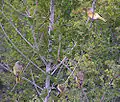| Cape canary | |
|---|---|
_1.jpg.webp) | |
| Scientific classification | |
| Domain: | Eukaryota |
| Kingdom: | Animalia |
| Phylum: | Chordata |
| Class: | Aves |
| Order: | Passeriformes |
| Family: | Fringillidae |
| Subfamily: | Carduelinae |
| Genus: | Serinus |
| Species: | S. canicollis |
| Binomial name | |
| Serinus canicollis (Swainson, 1838) | |
| Subspecies | |
|
3, see text | |
The Cape canary (Serinus canicollis) is a small passerine bird in the finch family. It is a resident breeder in southern Africa and has been introduced to Mauritius and Réunion.
Its habitat is fynbos, grassland and gardens, preferably in highland areas. It builds a compact cup nest in a scrub.
The Cape canary is 11–13 cm in length. The adult male has a green back with black edging to the wing feathers wings and tail. The underparts, rump and tail sides are yellow, and the lower belly is white. The rear head and neck are grey, and the face is cinnamon. The female is similar, but with less grey on the head. The juvenile has greenish-yellow underparts with heavy brown streaking. This species is easily distinguished from the yellow-fronted canary by its lack of black face markings.
The Cape canary is a common and gregarious seed-eater. Its call is tsit-it-it, and the song is warbled goldfinch-like trills and whistles given in display flight or from a high perch.
Phylogeny
This species is phylogeneticagy included within the group of Serinus alario now thriving around the southern tip of Africa, together with Serinus syriacus (Asian distribution and Asian and African patches in winter) and Serinus pusillus (Asian distribution) Arnaiz-Villena et al., 1999
Subspecies
Arranged alphabetically.[2]
- Cape canary (S. c. canicollis) (Swainson, 1838)
- S. c. griseitergum Clancey, 1967
- Kivu canary (S. c. sassii) Neumann, 1922
The East African subspecies (S. c. flavivertex) is very distinctive, much brighter, and with a yellow head, lacking the grey colour. It is now usually given species status as the yellow-crowned canary (S. flavivertex).
Gallery

 Four in a tree, South Africa
Four in a tree, South Africa
References
- ↑ BirdLife International (2018). "Serinus canicollis". IUCN Red List of Threatened Species. 2018: e.T22736315A132189111. doi:10.2305/IUCN.UK.2018-2.RLTS.T22736315A132189111.en. Retrieved 13 November 2021.
- ↑ Serinus canicollis, ITIS Standard Report
